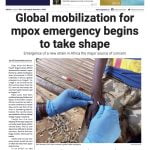The European Commission approved an Irish €200 million scheme to support companies affected by the coronavirus outbreak, as the plan was found to be in line with the EU state aid rules.
The scheme, that was approved under the temporary framework adopted by the Commission to support the european economy during the COVID-19 outbreak, will allow certain firms in Ireland to access loans if they are currently experiencing or expect to experience a decline in turnover of at least 15% due to the pandemic.
In a statement, Executive Vice-President Margrethe Vestager said that ‘‘With this €200 million Irish scheme, approved under the new State aid Temporary Framework, we continue to work with Member States to ensure timely support to the economy through these difficult times.’’
‘‘This measure will, in the form of repayable advances, help companies affected by the coronavirus outbreak to weather this crisis and bounce back strongly afterwards,’’ she added.
The beneficiaries of the support would be companies in Ireland with ten or more full-time employees in certain manufacturing sectors and/or internationally traded sectors, that have a turnover of less than €500 million per year. Each firm eligible for the support would receive a grant of up to €800,000.
The Commission labelled the Irish scheme ‘‘necessary, appropriate and proportionate,’’ as it will help manage the economic impact of the coronavirus crisis in Ireland.
The Temporary Framework has been adopted by the Commission on March 19 to enable EU member states to use the full flexibility foreseen under state aid rules to support the economy during the COVID-19 outbreak.
Under the temporary rules, member states can offer grants of up to €800,000 to a company to address its urgent liquidity needs and provide guarantees for loans taken by companies from banks.
States can also provide subsidised public loans to firms, short-term credit insurance where needed, as well as safeguards for banks that state aid is channeled directly to the banks’ costumers and not to the banks themselves.
The Temporary Framework will be in effect until the end of 2020, with a possibility of further extension.
EU approves €200m scheme to support Irish firms during COVID-19 outbreak
EPA-EFE/OLIVIER HOSLET
EU Commissioner for Competition Margrethe Vestager, from Denmark, speaks at a news conference on the concurrence case with the Qualcomm company, in Brussels, Belgium, 24 January 2018.
- Advertisement -
- Advertisement -






